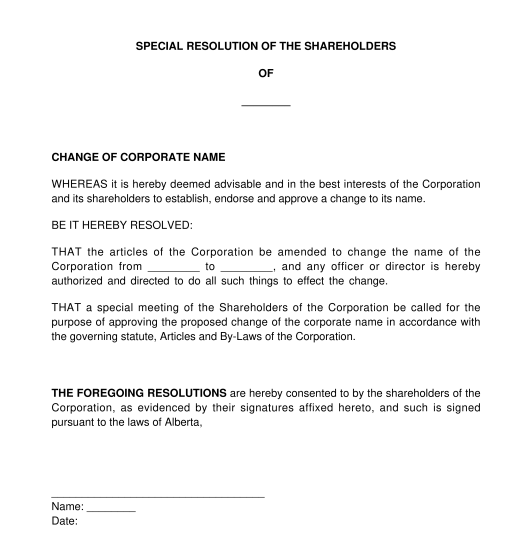 31/10/2025
31/10/2025

Answer a few questions and your document is created automatically.

Your document is ready! You will receive it in Word and PDF formats. You will be able to modify it.

 31/10/2025
31/10/2025
 Word and PDF
Word and PDF
 1 page
1 page
A Shareholders' Resolution is a written document that describes the actions taken by the shareholders of a corporation. The resolution highlights formal decisions made by shareholders and proves that the action taken by the shareholders on behalf of the corporation was approved.
Shareholders ultimately control the corporation through their ownership of shares with voting rights, and they have the power to vote for the election and dismissal of the board of directors, and the power to review and approve the corporation's financial statements, among other things.
There are two types of resolutions:
Yes. Having a shareholders resolution is necessary in order to legalize any of the changes that shareholders have made. This means that without a resolution, the change won't legally take effect.
Some of those changes include:
A shareholders resolution must contain:
Only the shareholders of the corporation may sign the resolutions. Neither a director nor an employee can sign the document unless they are also shareholders with the right to sign. Signing a resolution without the required legal authority voids the resolution.
This document should be filled out and signed by the shareholder(s) of the corporation to effect one or more of the above changes. The resolution may need to be delivered to the appropriate government authorities. For example, if the shareholder(s) are dissolving the corporation, a copy of the dissolution resolution will be delivered to Canada Revenue Agency (CRA). Once the document is filled out and signed, place it in the corporation's minute book (either print and put it in the physical binder or save a PDF to the electronic minute book).
Corporations are incorporated under federal or provincial laws, which dictates the rights and duties of a corporation's shareholders, as well as obligations regarding corporate records. Each statute is similar in nature. The following pieces of legislation govern corporate resolutions:
You fill out a form. The document is created before your eyes as you respond to the questions.
At the end, you receive it in Word and PDF formats. You can modify it and reuse it.
Resolution of Shareholders - Template - Word & PDF
Country: Canada (English)